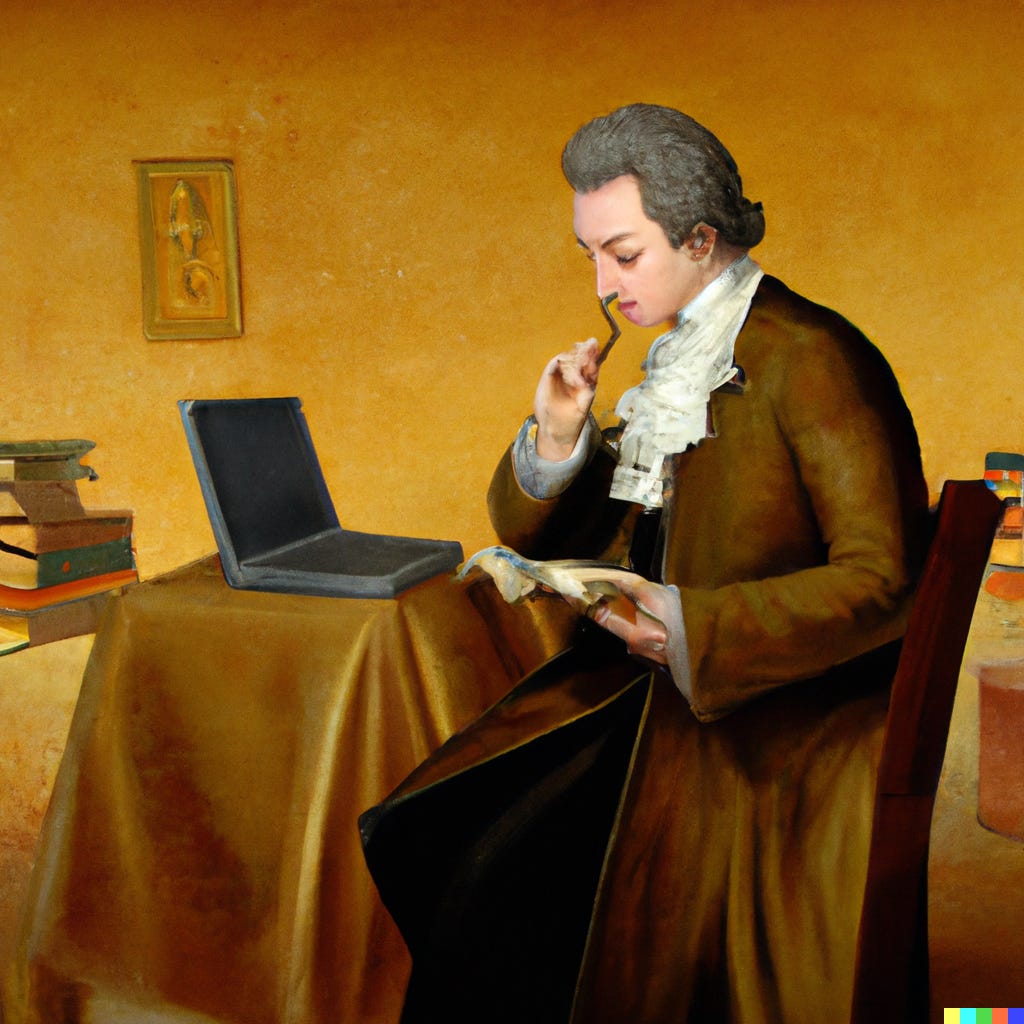NBN Newsletter #3: Encyclopedias
Featuring two curated playlists, a Q+A with Professor Julian E. Zelizer, and an interview with Annie Rauwerda, creator of Depths of Wikipedia
Encyclopedias
Encyclopedias collate vast sums of human knowledge into accessible summaries. The purpose of an encyclopedia is to give researchers access to peer-reviewed information without needing to search far and wide for the right book or expert. Encyclopedias typically trade depth for breadth. Despite this, they are invaluable resources. Denis Diderot, a leading philosopher of the Enlightenment, is most famous for the Encyclopédie. This multi-volume work helped spread Enlightenment ideas and popularize many French writers of the mid-18th century.
The information at our fingertips today far surpasses that produced by Diderot and his ilk. More than 200 years later, we can access millions of books, scholarly articles, and encyclopedia entries. In this week’s playlist, you will learn about Diderot’s art of free thinking, H.G. Wells’ original vision for the internet, historical developments of information technology in China, how we got from Gutenberg to Google, and the future of Wikipedia.
Scholarly Sources
Julian E. Zelizer is the Malcolm Stevenson Forbes, Class of 1941 Professor of History and Public Affairs at Princeton University.
Q: What are you reading right now?
A: After Life: A Collective History of Loss and Redemption in Pandemic America.
Q: What is your favorite book or essay to assign to students and why?
A: Larry Kramer’s Reports from the Holocaust is a fascinating first-person account of the AIDS crisis in the 1980s with powerful lessons for our current times about the nexus between activism, politics, and public health policy.
Q: Is there a book you read as a student that had a particularly profound impact on your trajectory as a scholar?
A: Richard Hofstadter’s The Age of Reform.
Q: Which deceased writer would you most like to meet and why?
A: Jerry Garcia, if musicians count. His songs and his singing have been like a soundtrack to much of my adult life.
Q: What’s the best book you’ve read in the past year?
A: Rachel Bade and Karoun Demirjian’s Unchecked: The Untold Story Behind Congress’s Botched Impeachments of Donald Trump.
Q: Have you seen any films, documentaries, or museum exhibitions that left an impression on you recently?
A: Travelin’ Band: Creedence Clearwater Revival at the Royal Albert Hall.
Q: What do you plan on reading next?
A: Darryl Pinckney’s Come Back in September: A Literary Education on West Sixty-Seventh Street, Manhattan.
Episode Spotlight: Depths of Wikipedia
In 2020, during the nadir of the pandemic, Annie Rauwerda began posting strange, humorous, and obscure Wikipedia entries on social media. She dubbed her project Depths of Wikipedia, and after several hundred posts on Instagram and Twitter, she began to amass a following of fellow Wikipedians. More than two years later, Depths of Wikipedia has more than one million followers and a touring live comedy show. In addition to professionally browsing Wikipedia, Annie works with the Wikimedia Foundation on a number of exciting projects. In this interview, Annie describes her spectacular rise to Wiki fame, her burgeoning career as a comedian, and the future of the internet.
Investigating Empire
History curricula change frequently. One area that’s particularly scrutinized at the moment (at least in the UK) is what is, or isn’t, taught about empire. Empire as a general concept, but also specifically about the British Empire, the other (mainly European) empires it competed against, and the legacies from all of this that are still with us today. There is so much fabulous scholarship on these topics among NBN episodes. This playlist focuses on books that complicate ideas of empire, linking the past and present, the overt, and covert.
New Books, Links, and Other Things
Lewis H. Ziska, Greenhouse Planet: How Rising CO2 Changes Plants and Life as We Know It (Columbia UP)
Suisheng Zhao, The Dragon Roars Back: Transformational Leaders and Dynamics of Chinese Foreign Policy (Stanford UP)
Quentin Tarantino, Cinema Speculation (Harper)
Ruben Östlund’s Triangle of Sadness
Blurbs
Blurbs (If you’ve just finished an exceptionally engrossing book, listened to a great NBN episode, discovered a new podcast, or stumbled across an interesting website, please email caleb@newbooksnetwork.com)
"Recently, democracy’s fall has been defined by navel-gazing partisans searching for technocratic fixes to an ineffable endeavor; Timothy Shenk, author of Realigners: Partisan Hacks, Political Visionaries, and the Struggle to Rule American Democracy, rejects such solutions. Instead, he defines American democracy as a history of arguments over how to draw “the golden line between the rulers and the ruled.” Through a set of vivid profiles, featuring notable figures from Phyllis Schlafly to W.E.B. DuBois, Shenk retells the country’s founding to the New Deal coalition’s collapse. The result is refreshing and makes you wish every politico took democracy as seriously as Shenk does."
-Jarod Facundo (Washington, D.C.)












